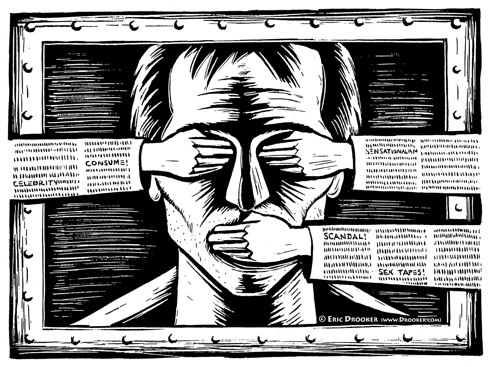
I support copyright, as long as it fights plagiarism and encourages creativity. The reality is that most corporations and money-minded individuals want to and do use copyright just to make money (alone) off their products by preventing others from accessing them without paying for them.
I love making non-linear comparisons in my head which most people would label as ‘weird’. Why those corporations and individuals support copyright can be compared to why most people in the developing countries support marriage — to have sex. Unfortunately, uneducated/half-educated/misinformed people have lots of misconceptions. One of them is about pre-marital sex. I’ve seen people consider such a natural thing as a sin. There’s, like, no fancy relationship statuses for them. It’s either ‘married’ or ‘unmarried’.
Well, it reminds me of domain name registrars. A domain can either be ‘available’ or ‘taken’. No matter if you’re of Microsoft fame or some 80 years old clueless person, you can’t put your hands on my domain once I complete the purchase of the domain.
Back to copyright.
I’d support, if not copyright, a similar mechanism to prevent people from making significant money off totally ripped-off content. It’s normal for hard-working creative brains to go crazy if they see someone else making loads of cash off their result of work, which took lots of time and effort from their side.
If I write a really cool guide about something, and publish it on the internet for free for the convenience of people, and a bigger publisher makes money off it from ads (without it being their #1 intention) by posting it on their site, I probably wouldn’t mind that much.
However, if they claim to be the original creator of that content and attempt to sell it to their users, then probably I’d want to do something. So, there’s clearly a difference between the two cases, but this is about free material, right? The situation gets different when it involves money…
Copyright has become an easy way, using which large companies can sue smaller ones and individuals, whenever they wish. It’s seen a stage where it’s being abused heavily by big organisations.

It’s unfortunate for user-oriented communities to get sued by large corporations for publishing their paid content unknowingly through user-submissions.
Recently, ‘Music World’, a renowned offline store of Music & Movies CD/DVDs here in Kolkata, India, shut down, stating that they’re not making enough profit from things like DVDs anymore.
While they themselves didn’t blame anything, a few creators (artists) did.

The summary of what they basically said is that, Governments should be more strict about enforcing various copyright laws. They should actively monitor and control the internet. They should remove whatever material they find objectionable. It leads me to my next point.
Do you seriously think that the Internet is owned by a single person/organisation, such as your Government?
I feel that corrupt Governments are in no position to restrict user-freedom by actively controlling such a widespread thing as the Internet.
On the other hand, companies and angry creators shouldn’t ignore the change of consumption patterns of products. Users want to consume digital content in more non-traditional ways.
The concept of donating money to the original creators for the digital content that they produce surfaced in the past decade, and services like Flattr allow you to do so already.
The process of sales, has always been people-centric and user-driven. What the supporters of the traditional consumption methods are trying to do is like, exchanging one product with another for mutual benefit as in the ancient age, as opposed to using money (a currency) to buy/sell things.
Fifty years from now, when we’d look back, I think this’ll be the case.
Okay, so David Cameron decided to somewhat block porn in the United Kingdom for anyone who’s unable to prove that he/she is over 18. Not going into the topic whether something like porn is a biological need for teens going through puberty, that still raises some questions in my head:
- Do you think, children take domestic internet connections themselves providing their own names and details to the ISPs? Don’t know about United Kingdom, but this surely isn’t the case in most parts of the world.
- It’s easy for a non-technical person to utter a few sentences ordering his lower-authorities to block pornography-related websites for unverified users on the internet. Is it practically achievable / anything close to easy?
- In case of domestic internet connections shared by numerous members of a household, is it possible for the adults to completely block adult content from ISP-level for the sake of minors in the household?
The Telegraph UK published a survey suggesting that all men watch porn. It’s not that different with women either.
“We started our research seeking men in their 20s who had never consumed pornography,” said Professor Simon Louis Lajeunesse. “We couldn’t find any.”
The study found that men watched pornography that matched their own image of sexuality, and quickly discarded material they found offensive or distasteful.
Exactly my point. People, including kids, aren’t all dumbheads. They have their own shares of sensibility.
Today, you’re blaming pornography for sexual violence on women. In my opinion, the actual reasons of that happening in India is illiteracy among people, improper depiction of women in mainstream movies and media, and self-righteous men who pretend think the best way to prevent women from getting sexually harassed is men giving them protection. No, it’s not the best way. The best way always is not attempting to violate them in the first place. Women need no additional protection, unless they’re made to require that. A personal favourite music video on the subject:
I firmly believe that as civilised and educated people, freedom of speech is something that we can’t and shouldn’t sacrifice. After all, what might seem reasonable to the Prime Minister, might not seem so to me. And I wouldn’t have a chance to prove my point either.
It’s no wonder that sensible corporations like Google asks Internet users to take action, stating:
There is a growing backlash on Internet freedom. Forty-two countries filter and censor content. In just the last two years, governments have enacted 19 new laws threatening online free expression.
That’s almost all that I have in mind about these two things. If you have anything to say about this post, feel free to drop a comment below.
